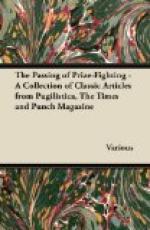The Editor of The Times strongly demurred to the statement that KLINGSOR was an Arabian. The great authority on KLINGSOR was the anonymous thirteenth-century epic poem on Lohengrin, the father of Parsifal, and he had no doubt (1) that the author was either a Czecho-Slovak or a Yugo-Slav; (2) that KLINGSOR, as the etymology suggested, was of the latter race. In these circumstances the attempt to establish an affinity between Mr. LLOYD GEORGE and KLINGSOR was nothing short of an outrage, which might have disastrous results on our relations with the new States of Central Europe.
Mr. J. MAYNARD KEYNES observed that the characterisation of Mr. LLOYD GEORGE, implicit in the defence of KLINGSOR made by the musical critic of The Daily Mail, indirectly confirmed his own impressions. It was true that the PREMIER did not physically resemble an Arab sheikh, and his knowledge of medicine, science or philosophy, to say nothing of geography, was decidedly jejune, but the sad case of President WILSON made it all too clear that he was capable of exerting a hypnotic influence on his colleagues. Mr. KEYNES did not think Mr. LLOYD GEORGE was an Aristotelian; he preferred to consider him an unconscious Pragmatist. This view he proposed to develop in his forthcoming volume on the Subliminal Conscience of Nonconformity.
* * * * *
TO JAMES (MULE) WHO HAS PLAYED ME FALSE.
[Many mules are appearing upon the streets of London and are showing an extraordinary and unexpected docility amidst the traffic.]
James, when I note your air supremely
docile,
Your well-fed look of undisturbed
content
(Doubtless you find this land an adipose
isle
After lean times on active
service spent),
I do not join with those who hymn your
praises
For calmness mid the turmoil
of the town;
I find myself consigning you to blazes—
James,
you have let me down.
For I am one who, after having striven,
A hero (vide Press)
though far from bold,
Has come back home and, naturally, given
Artistic touches to the tales
he’s told;
The Transport was my scene of martial
labours;
That was the section where
I saw it through;
And I have told astonished friends and
neighbours
Some
lurid yarns of you.
You are the theme I have been wont to
brag on;
I’ve told how you, my
now innocuous moke,
Would chew the tail-board off a G.S. wagon
By way of mere plaisanterie
(or joke);
Dubbed you most diabolical of ragers,
A rampant hooligan, a fetid
tough,
A thing without respect for sergeant-majors—
That
is to say, hot stuff.
Full many a fair young thing I’ve
seen displaying
A sympathetic pallor on her
cheek
And wonder in her eye, when I’ve
been saying
How almost every day in Salonique
You jazzed with me on brinks of precipices;
But when I talk to-day they
cannot fail
To think of you in town and murmur, “This
is
A
likely sort of tale.”




